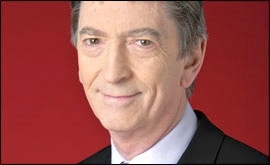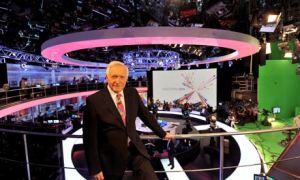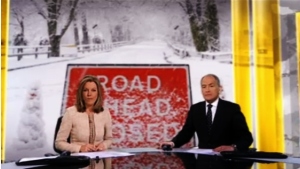At the time it was a pioneering moment. Broadcasting news and having journalists report on national, international and regional stories. It is difficult to think of waking up without some programme providing an early morning dose of headlines and information. There was a time, however. Today, the market for breakfast television is greater than ever before. The consequence is a decline in viewers of early morning television journalism.
Our busier way of life, the increasing demands of work and economy, and demanding childcare has confidently led to dwindle in the number of viewers who want news at breakfast. It’s very much a subconscious thing. Automatically, many households head straight to a news programme. Ensuring children and pets are fed and cleaned, getting to school and work on time are the tasks that become mundane and routine. Journalism and news are simply background to the lifestyle that so many lead and it can become very easy to either avoid news or simply take these programmes for granted.
In its greater and younger life, ITV’s breakfast offering, GMTV, managed to inform, entertain and connect with the millions of loyal viewers who regularly watched the award winning programme. Today, it’s successor, Daybreak, averages less than one million viewers a day. A sharp decline. Even before ITV took full control of its breakfast content, journalism on GMTV wasn’t groundbreaking. Reports were short, often gimmicky and a bit ‘cheap’ compared to other options. However, as it attracted an overwhelmingly large audience, politicians ensured GMTV was a regular for any interview. Although not having a strong journalistic background, the connection and rapport between presenters and audience paved the way for interviews that were truthful, honest and audience orientated. Perhaps tacky around the edges, but the balances between news, celebrity and real lives made GMTV somewhat the must watch breakfast programme. An understated and less pompous approach to journalism which clearly is what the audience wanted.
The demise of GMTV was partly down to its own making. Accusations of fraud and misleading viewers in competitions led many of its loyal and regular viewers away. The demise of the programme had begun. At the same time, the BBC’s traditional hard news approach to early morning viewers was about to change.
When it comes to searching for reliable news, business and regional news updates, viewers seem to intuitively choose the BBC over other rivals. It was the ‘beeb’ who began the breakfast phenomena in 1983. Soon, the format changed to desk based news, attracting a substantially smaller audience than the more family orientated GMTV. It could, therefore, be presumed that even back in the late 1980’s and 1990’s, perceptions of news and hard journalism were ‘boring’, similar to some modern day ideas. Today, the BBC’s Breakfast programme captures little over 1.5 million viewers compared to ITV’s Daybreak 700,000. The programme is now completely sofa based and mixes viewer interest with the news and sport headlines until 8:30 when the focus shifts to entertainment and culture.
To me, there is something universally exciting, exhilarating and attractive about waking up to an unexpected breaking news story. Certainly the moment I heard about Michael Jackson’s death via BBC News or the rescue of the Chilean miners are amongst the stories that represent the absolute need for news at breakfast time. However, as numbers for programmes such as Breakfast, Daybreak and Sunrise all fall short of past lives, the facts show a change in the way we, as viewers, receive our news.
Viewer habits have certainly changed considerably. Gone are days of national newspapers over cereal, in are the days of watching virtually anything on TV. Given the increased demand of work and childcare, there is much criticism of television journalism in the early morning. Clearly BBC Breakfast proves to be a successful formula of news and entertainment (with a mix of light hearted features) yet there was much scepticism when the programme left London bound for Media City, Salford. Some suggest the quality of the programme has deteriorated and it is true that there is less ‘newsier’ content than in years gone by, however the overall feel of the morning programme feels identical, if not better and stronger, than when it was homed in the Capital. The idea in bringing in less news and more features represents viewer interests. It may feel like endless padding to fill the programme with content, but it is a more friendly approach to journalism that viewers want. The One Show represents a popular magazine programme with some journalistic content; it seems many of our breakfast providers want to follow this route in hope of attracting a large audience, at times forgetting the real reason behind their own early morning programmes.
For many, the news represents a dark outlook, at times bias, and at others completely downbeat. Yet if we consider it a bit more, the news often shapes the day that will follow. Morning conversations, in work or elsewhere, relate to what the days news agenda is built of. The news, of which we all have opinion, not only builds our days, but often shape our lives. Certainly for those like me, aspiring journalists, breakfast news programmes provide a strong base for experienced and new talent.
As rumours circulate that ITV could be about to once again revamp its breakfast output, it’s hard not to think about the alternatives to core news and journalism at such an early hour. The slide in ratings is more to do with a tarnished brand rather than the formula and content of the programme; ITV has become the provider of light entertainment held together with a small amount of news. Perhaps that is the problem. For those who don’t choose to watch the comedy offering on Channel 4, or digital news on Sky, there is not much else to offer. ITV’s timeslots can often change and are regularly governed by advert breaks, breaking traditions of regular news in a regular timeslot. Unfortunately, the commercial broadcaster doesn’t offer enough journalism to keep an audience interested. Regional news is less than three minutes an hour and the programme has often been dubbed ‘gossip-break’ given the lack of real, credible news. At breakfast, the BBC still remains the strong and professional broadcaster, despite criticisms of bias and unfair representations.
That’s not to say ITV should give up. Its output on the national ITV News is, at times, more balanced and in depth than the BBC. Investigative journalism has governed the ITN newsroom in recent months and the quality of journalists, presenters and editors has grown significantly. A programme with the content of what ITV has built up would be a real rival to other news providers.
Breakfast television is more a psychology subject. Questions need to be asked about what viewers expect, how long viewers can stay interested and what type of journalism they are after. To simply give up on breakfast journalism would be a tragedy. Yes, early morning news is not made up of the brand leading investigative reports, but why should it be. At that time of the morning, a summarising description of what is happening around the globe is enough. A viewer can feed on what they have learnt for an entire day.
Look at radio journalism and its increased popularity. The Chris Evans Breakfast show on BBC Radio 2 attracts more viewers than both BBC1 and ITV combined. His show, a mixture of magazine, interest and interviews, strikes a core balance amongst those early morning drivers. Further evidence of a shift in lifestyle. News summaries every half hour are just the right length for the average listener and the Evans approach of news commentary certainly gains a laugh in places and applause in others. It is perhaps a clear perception that radio journalism is more popular, if not more accessible, than television journalism. Chris Evans’ lighter approach to the news must be a ratings winner, again showing that viewers do want a mixture in their media content.
Subconsciously, news has become a part of day-to-day life. Notifications on social media and mobile telephones alert the breaking headlines. Conversation on national and local radio often integrate news and information. In the 21st century, it is difficult to escape from any kind of journalism.
Whatever a viewer thinks about breakfast journalism and whether news should be shown or heard over tea and toast, for many the first connection of the day is the news at breakfast. It is a live broadcast in the sense that the news breaks as the programme airs. The energy and trepidation of the journalists that bring the headlines is all too apparent. As many strive to strike the right balance, for many the news at any time of the day is a must avoid. Yet, consider how empty a day would feel without a burst of information on world events. Breakfast journalism matters.











